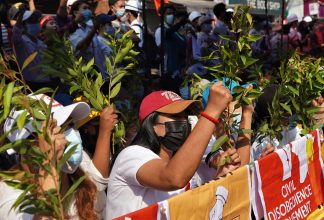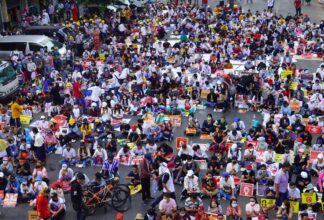Women Human Rights Defenders are Tortured and Raped
Op-Ed article published in Swedish at Newsmill on the International women’s day:
The world must pay attention to the brave Burmese women whose struggle for human rights places their lives and health at risk. Civil Rights Defenders urges the international community not to reconsider its stance against the Burmese government until the human rights situation in the country is showing concrete improvements.
One of these women human rights defenders is Nilar Thein, who is currently serving a 65-year prison sentence for participating in the anti-government protests in 2007. Nilar Thein has spent a third of her life behind bars. In 2005, after having served a nine-year prison term for her peaceful dissent, she told how prison officials and male prisoners convicted of rape subjected her and other female prisoners to sexual abuse and harassment. When they reported the abuse, the women were punished, not the perpetrators.
The 2007 demonstrations in Burma are called the Saffron Revolution because it was the monks in saffron-coloured robes that initiated them and took the lead. After a few days, the junta launched a violent crackdown on the peaceful demonstrators, in which nearly 150 people were killed. Thousands were arrested, including Nilar Thein’s husband Kyaw Min Yu. Nilar Thein also risked arrest and went into hiding, from where she continued to urge the international community to speak out against the junta’s gross human rights violations. In September 2008, after a year on the run, she was captured.
Today over two thousand human rights defenders and political prisoners are imprisoned. At least 169 of them are women. Nilar Thein, Suu Suu Nwe and Phyu Phyu Thin are among the most well known. All three are serving long sentences in prisons where conditions are so inadequate that they can be described as life-threatening. Many women whose husbands or fathers are democracy activists are being held hostage in cases where the authorities have failed to arrest the men.
Nilar Thein is one of many prominent women who selflessly and at great risk work for human rights. In an interview with Radio Free Asia in 2007, Nilar Thein said that the women of Burma who are interested in politics are at risk of being subjected to violence, torture and murder.
But Burma’s female human rights defenders are not only fighting against the repressive regime. Traditional gender roles hamper their involvement in social activism and have made them particularly vulnerable in the struggle for democracy. The CEDAW Committee, the UN expert body which monitors the states’ compliance with the women’s rights convention, expressed in a 2008 report concern over widespread violence against women in the Burma. The silence and impunity that surrounds sexual violence against women indicate it is socially accepted, and the Committee notes that the violence particularly affects marginalized and vulnerable women and girls.
The fact that very few NGOs are allowed to operate in Burma adds to that vulnerability. The work of human rights takes place under the radar and the country’s human rights defenders are taking huge risks. There are no indications of a political thaw in the wake of the parliamentary elections in November 2010.
Nilar Thein, 39 years old, has had recurring health problems but has been denied medical care in prison. In December 2010 she was placed in solitary confinement and forbidden to receive visits by her family for over a month. In protest, she went on hunger strike. The information flow from Burma’s prison is so limited and her health status today is not known. Her husband, Kyaw Min Yu, is also serving a 65-year sentence for his involvement in the protests in 2007. They are in different prisons and their now four-year old daughter is staying with relatives.
The international community must not base their stance towards the military junta on hopes for democratic change, but on concrete actions. One such concrete act would be the unconditional release from prison of Nilar Thein and other human rights defenders and democracy activists. Another would be to initiate an impartial investigation of allegations of torture, sexual violence and harassment against female political prisoners, and to bring those responsible to justice. As long as these basic requirements remain unfulfilled, it is crucial that the EU and the rest of the world does not soften its position towards the Burmese government.

